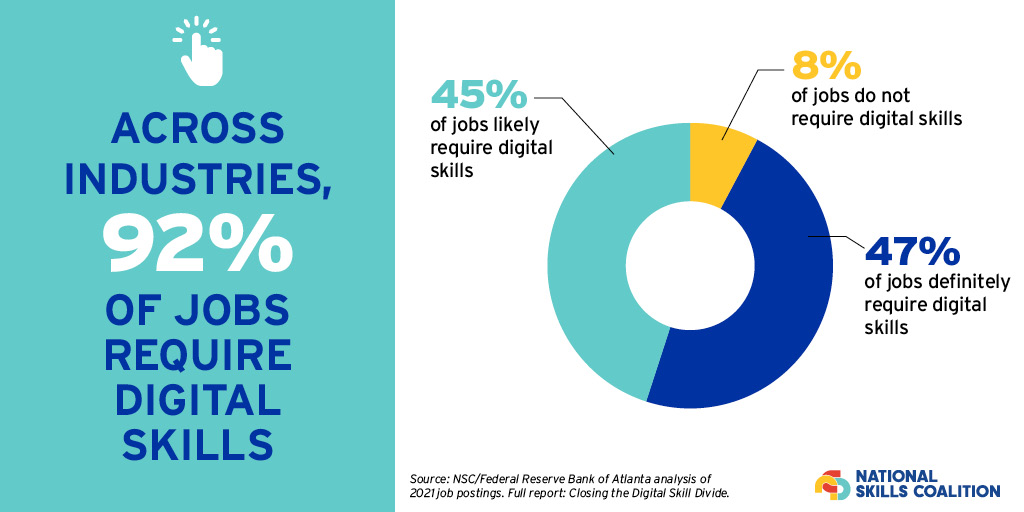New Report: 92% of Jobs Require Digital Skills, One-Third of Workers Have Low or No Digital Skills Due to Historic Underinvestment, Structural Inequities

Closing the digital skill divide would generate significant, measurable economic payoff for workers, businesses, and the broader economy
February 6, 2023 – Today, National Skills Coalition (NSC) in partnership with the Federal Reserve Bank of Atlanta released Closing the Digital Skill Divide, a real-time snapshot of demand for digital skills in the US labor market. The analysis finds that 92% of jobs analyzed require digital skills. Previous NSC research found one-third of workers don’t have the foundational digital skills necessary to enter and thrive in today’s jobs. Together, these findings point to a significant digital skill divide. The new report also found that public investments in closing this digital skill divide can generate measurable economic payoff for businesses, workers, and the broader economy.
The report finds strong demand for digital skills across every industry (dispelling misconceptions that demand exists primarily in the tech sector) and in almost every occupation, including entry-level and frontline positions. The report also finds that the digital skill divide disproportionately impacts workers of color, individuals with low incomes, and rural residents, due to historic underinvestment and structural inequities.
The findings come at a pivotal moment as states plan to implement the historic $2.75 billion Digital Equity Act, part of the bi-partisan infrastructure law. The program provides funding to advance digital equity among populations most impacted by the digital divide.
The findings suggest that states that target resources toward digital skill building could generate measurable monetary benefits:
- Workers that qualify for jobs that require even one digital skill can earn an average of 23 percent more than in a job requiring no digital skills. Moving from a job requiring no digital skills to one requiring at least three can increase pay by an average of 45%.
- For the economy as a whole, these increased earnings could generate more state and federal tax revenue. Depending on the household size and composition, this could range from $1,363 to $2,879 in additional tax revenue per household per year.
- For businesses, turnover costs (estimated at $25,000 when a worker quits within the first year to over $78,000 after five years) can be averted or delayed by ensuring that workers have upskilling opportunities.
“State policymakers are asking a lot of questions about how to most effectively target new federal resources to close the digital divide. With this groundbreaking research, any question about whether digital skills are as important as broadband and devices has now been answered,” said Andy Van Kleunen, National Skills Coalition CEO. “This report drives home that access to digital skill building is essential to advancing equity, opportunity, and economic growth.”
“This research shows how fundamental and foundational digital skills have become in the labor market,” said Sarah Miller, Principal Advisor, Federal Reserve Bank of Atlanta. “These are critical skills the workforce needs to have now and into the future. Policymakers and program administrators should view digital skill development as baseline as digital access to ensure economic mobility for the communities and workers they are serving.”
Over the next year, National Skills Coalition will work with policymakers, its member state coalitions, and corporate partner Comcast NBCUniversal to ensure more local and national leaders are aware of and take advantage of public sector digital equity funds to invest in the skill development programs that are critical to closing the digital divide.
“We’re proud to partner with the National Skills Coalition and drive deeper awareness of the digital skills gap that we have long invested in helping to close,” said Broderick Johnson, Executive Vice President, Public Policy & Executive Vice President, Digital Equity for Comcast. “The data is clear. Both fundamental and industry-specific digital skills are vital to individual economic mobility as well as the continued competitiveness of our nation’s economy. To address this critical challenge, policymakers at every level must commit public funds to training the workforce of today and tomorrow in partnership with nonprofits and corporations alike.”
While the report focused on national data, it found that demand for digital skills is high in every state and analyzed extensive data for two states – North Carolina and Illinois – as examples.
“Ninety percent of jobs in Illinois require digital skills,” said Juan Salgado, Chancellor for City Colleges of Chicago. “Many of our students are able to balance work, parenting, and education because they are choosing online learning, which also requires a high level of digital literacy. This report unequivocally demonstrates that digital skill building has a direct economic impact on students, families, businesses, and the community as a whole.”
The data analysis for the report was carried out as a joint project between NSC and the Center for Workforce and Economic Opportunity at the Federal Reserve Bank of Atlanta. The research team analyzed 43 million online job postings published in 2021 collected by Lightcast (formerly known as Emsi/ Burning Glass Technologies).
About National Skills Coalition
National Skills Coalition fights for inclusive, high-quality skills training so that people have access to a better life, and local businesses see sustained growth. We engage in analysis and technical assistance, organizing, advocacy, and communications to improve state and federal skills policies.
About the Center for Workforce and Economic Opportunity at the Federal Reserve Bank of Atlanta
The Center for Workforce and Economic Opportunity focuses on employment policies and labor market issues that affect low- and moderate-income individuals. It acts as a bridge between research and practice, connecting researchers, businesses, and policymakers with innovative approaches to creating economic opportunity through education and employment. The center also contributes to economic research and monetary policy discussions by tracking labor market trends affecting low- and moderate-income workers.